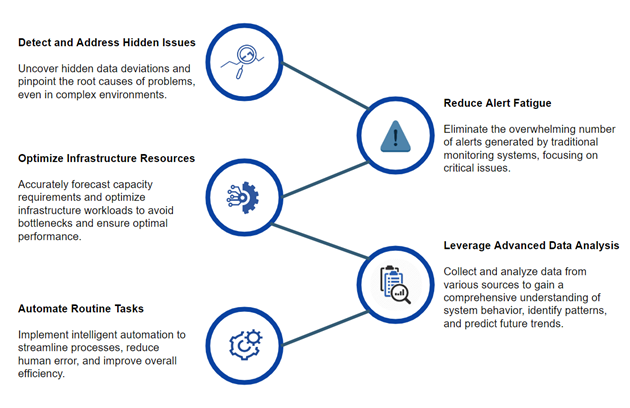
Revolutionizing IT Infrastructure: How Leading Software Companies Leverage ZIFTM for Enterprise Monitoring


In the ever-evolving landscape of IT infrastructure, maintaining optimal performance and minimizing incidents is crucial for enterprise success. IT infrastructure is the backbone of any enterprise. Leading software companies are increasingly turning to the Zero Incident Framework (ZIF™) to revolutionize their monitoring capabilities.
The Zero Incident Framework (ZIF™) is an AIOps-driven platform designed to optimize network operations through asset discovery, monitoring, proactive detection, analytics, correlation, noise reduction and intelligent automation. Leveraging advanced technologies like artificial intelligence and machine learning, ZIF ensures a high level of resilience and proactivity, enabling increased system availability and trying to achieve ‘zero outages’ across cloud, on-premises, or hybrid IT environments. The platform’s comprehensive approach allows organizations to manage and maintain IT infrastructure efficiently, ensuring seamless operations and minimizing downtime through its AI Automated Root Cause Analysis Solution.
ZIF has full-stack monitoring capability, which means it has provision to monitor all the layers of the IT infrastructure, like servers, storage, OS, network devices, APIs, containers, cloud, etc. ZIF has symptom-based and synthetic monitoring capabilities. It can identify signals and symptoms of an issue in advance as well as monitor proactively by simulating the user transactions.
ZIF offers robust agentless monitoring across cloud platforms like Azure, AWS, and GCP. It covers microservices, containers (Kubernetes), infrastructure, databases, networks, services, processes, URLs, and even USB/COM ports and end-user activities. This broad monitoring capability ensures seamless visibility into all aspects of your IT environment.
ZIF is a powerhouse for ensuring business reliability through its advanced capabilities. By measuring and predicting response times between transactions across different layers, ZIF provides a comprehensive view of service reliability. ZIF not only assesses current and historical response times but also predicts future latency issues, allowing for proactive management. ZIF’s prowess extends to anticipating device, application, and service failures, as well as performance degradation, which empowers IT engineers to maintain optimal service reliability. The platform’s auto-remediation bots handle errors before they escalate into problems, ensuring seamless functionality. By analyzing system and application usage through collected metrics, ZIF achieves an impressive 99.99% availability, backed by over 95% prediction accuracy. Its use of unsupervised algorithms to discover patterns and forecast potential downtime further underscores its excellence in maintaining business reliability.

ZIF provides a holistic approach to enterprise monitoring, integrating data from various IT sources— servers, networks, endpoints, and applications—into a single, unified platform. This integration allows for real-time visibility across the entire IT landscape, ensuring that no aspect of the infrastructure is left unchecked. By monitoring all components of the IT environment, ZIF helps companies proactively identify and address potential issues before they escalate into critical incidents
One of the key differentiators of ZIF is its use of advanced AI and machine learning algorithms. These technologies enable ZIF to analyze vast amounts of data and generate predictive insights, allowing companies to foresee potential disruptions and take preventive measures. This predictive capability is a game-changer for IT teams, as it shifts the focus from reactive incident management to proactive incident prevention, reducing downtime and improving overall system reliability.
ZIF goes beyond traditional monitoring by incorporating automation and auto-remediation features. Through the use of intelligent bots, ZIF can automatically resolve common issues without human intervention, significantly reducing the time and effort required to maintain IT systems. This automation not only increases efficiency but also ensures that critical incidents are addressed promptly, minimizing their impact on business operations.
In today’s digital age, security is a top priority for any enterprise. ZIF enhances security by continuously monitoring compliance with industry standards and detecting anomalies that could indicate potential security threats. With ZIF, companies can ensure that their IT infrastructure is secure and compliant, reducing the risk of data breaches and regulatory penalties.
ZIF’s comprehensive monitoring and proactive approach directly contribute to a better user experience. By ensuring that IT systems are always running smoothly, ZIF minimizes disruptions that could affect employees and customers. This, in turn, leads to higher satisfaction and productivity across the enterprise.
Zero Incident Framework (ZIF) is revolutionizing how leading software companies approach enterprise monitoring. With its AI-driven insights, AI Automated Root Cause Analysis, automation capabilities, and focus on user experience, ZIF empowers companies to maintain a robust IT infrastructure, reduce incidents, and drive business success. As the demand for reliable and efficient IT systems continues to grow, ZIF stands out as the solution of choice for forward-thinking enterprises looking to stay ahead in the digital era.
Please complete the form details and a customer success representative will reach out to you shortly to schedule the demo. Thanks for your interest in ZIF!